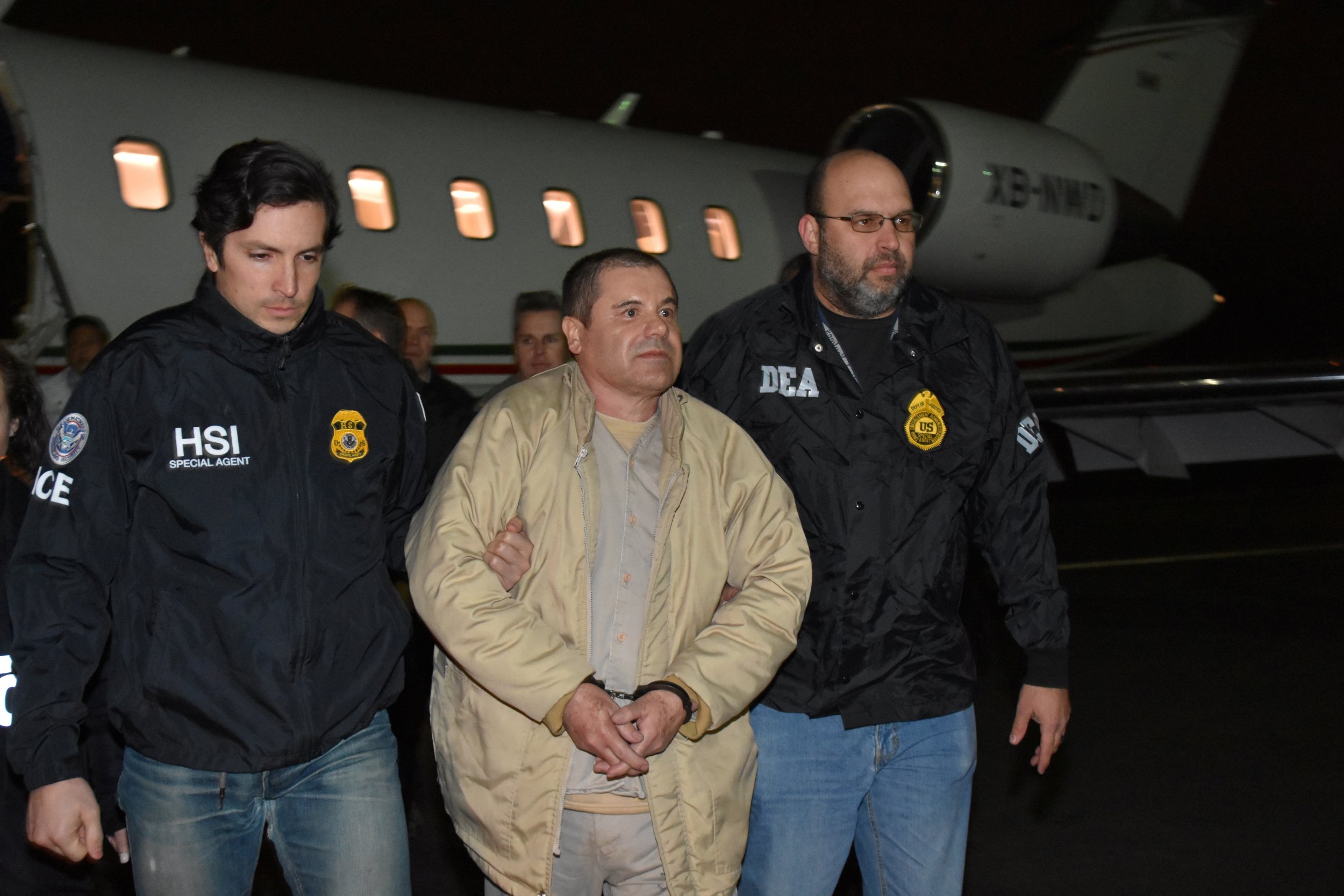
As one of the most notorious criminals of modern times prepared to face U.S. justice for the first time, a host of law enforcement officials gathered in Brooklyn, New York, on Friday morning to announce his extradition from Mexico—and to detail his rise to power.
Just hours after Mexican drug lord Joaquín Guzmán Loera—best known as El Chapo, which is Spanish for "Shorty"—flew from Ciudad Juárez, Mexico, to Long Island, New York, on a Mexican police plane on Thursday, Brooklyn U.S. Attorney Robert Capers laid out how U.S. pressure on Colombian traffickers in the 2000s created "a vacuum" that gave Guzmán room to grow.
"The efforts of U.S. law enforcement led to the extradition to the U.S. of countless Colombians, and so the Colombians sought to take on less risk by allowing the Mexican traffickers to assume that risk and bring those drug shipments to the United States," Capers says. "Traffickers like Guzmán quickly established drug distribution networks in the United States from coast to coast. Guzmán increased his profits at staggering levels."
The detention memo filed by federal prosecutors Friday—meant to convince a judge that Guzmán should be denied bail after the drug lord is arraigned—described in even more detail how the U.S. focus on the Colombians gave the 59-year-old his opening to become one of the world's biggest drug traffickers.
"Filling a vacuum in the United States left by the Colombian traffickers, the Mexicans established distribution networks across the United States," the court papers read. "These changes enabled Guzmán to exponentially increase his profits to staggering levels. Accordingly, Guzmán used this wealth to increase his power and the Sinaloa Cartel's footprint in the drug trafficking world."
Related: 'El Chapo' Guzmán, Mexico's most powerful drug lord
Guzmán would come to lead a drug empire that transported over 200 tons of cocaine into the U.S. and pocketed $14 billion in profits, prosecutors said Friday. The drug lord grew in notoriety, especially after escaping twice from Mexican prisons. "After more than a year of well-orchestrated planning, his workers dug a tunnel from a seemingly abandoned home, which was located over a mile away from the prison, directly into the shower in his prison cell," court papers state of his 2015 breakout. "This escape exemplified the power of Guzmán's drug empire and his control over government officials, even while he was incarcerated."
Law enforcement officials on Friday vowed repeatedly that Guzmán would not escape while in U.S. custody.
Describing the moment when Guzmán stepped off the plane at the Long Island airport Thursday night, Angel Melendez, the special agent in charge of Homeland Security Investigations in New York, said he looked into the eyes of "the most notorious criminal of modern times" and saw surprise and shock.
"You could actually see the fear as the realization started to kick in that he's about to face American justice. And he's about to face American justice in a city that's foundation is bedrock," Melendez said. "I can assure you no tunnel will be built leading to his bathroom."
Several federal prosecutors—including those in Miami and Chicago—had also filed indictments against Guzmán, who faces mandatory life in prison if convicted. Asked why Brooklyn was the best venue for the Guzmán trial, Capers smiled and answered with characteristic borough swagger that drew laughter from the gathered reporters: "Because it's Brooklyn."
Uncommon Knowledge
Newsweek is committed to challenging conventional wisdom and finding connections in the search for common ground.
Newsweek is committed to challenging conventional wisdom and finding connections in the search for common ground.
About the writer
Josh Saul is a senior writer at Newsweek reporting on crime and courts. He previously worked for the New York ... Read more
To read how Newsweek uses AI as a newsroom tool, Click here.








